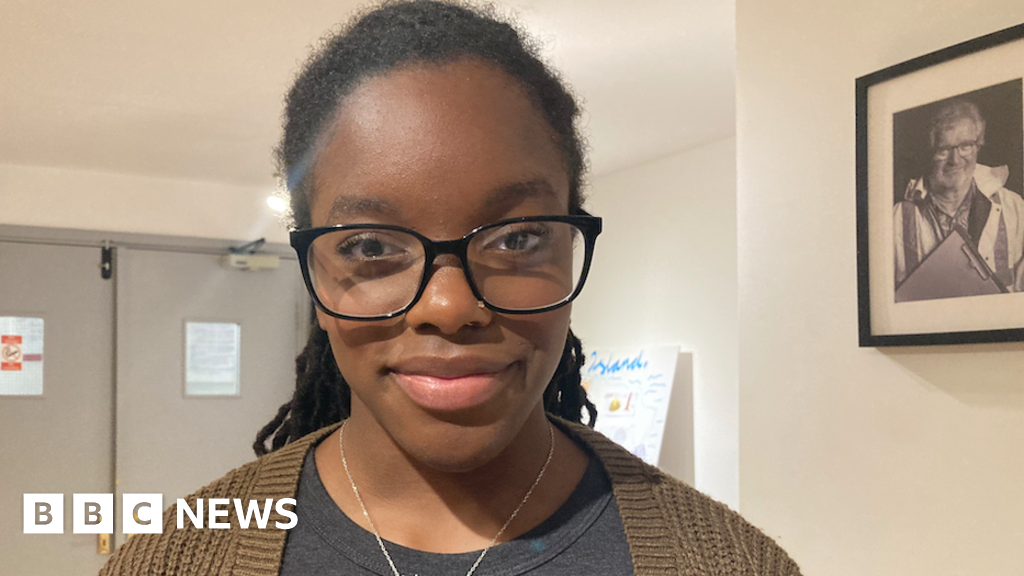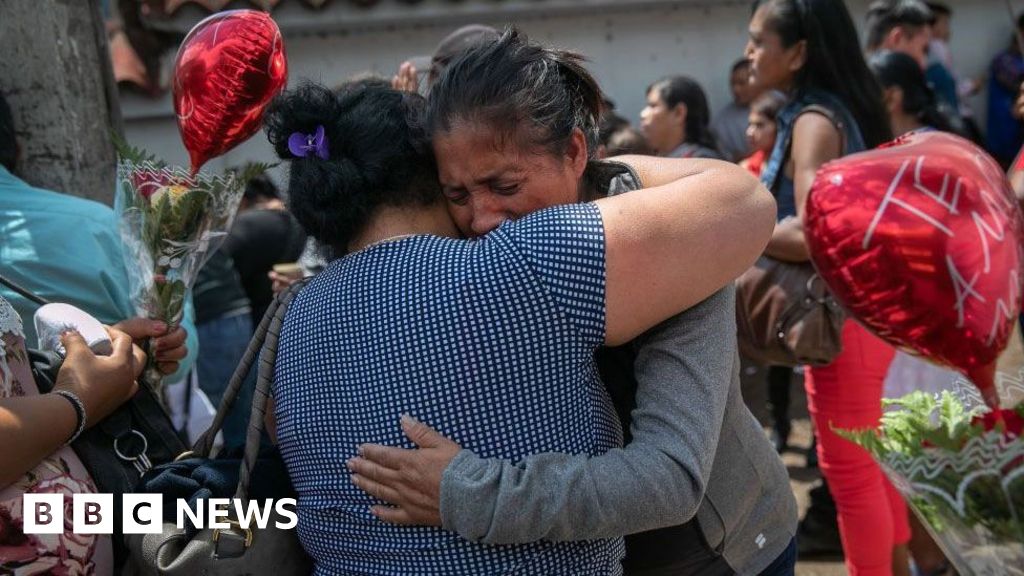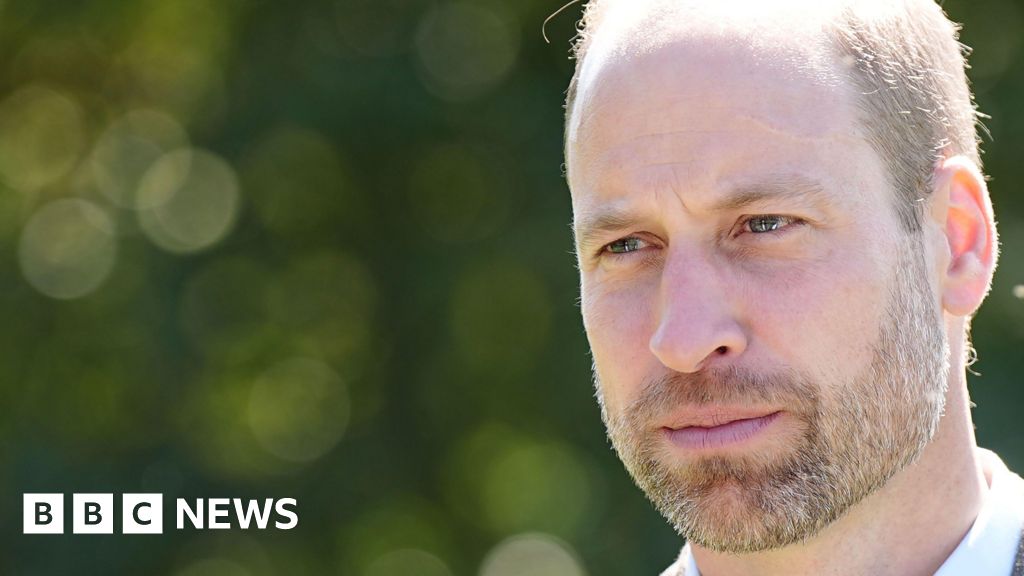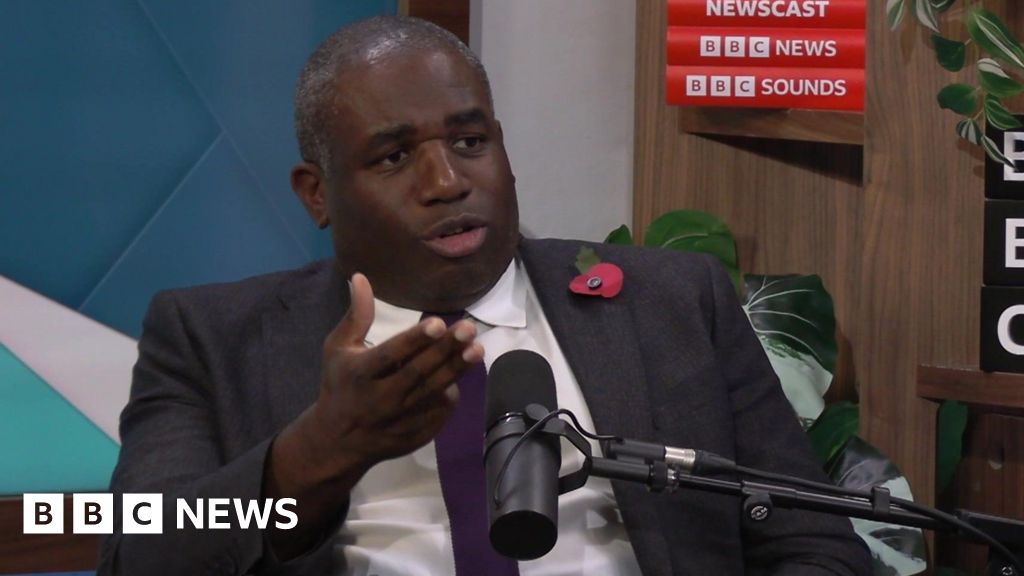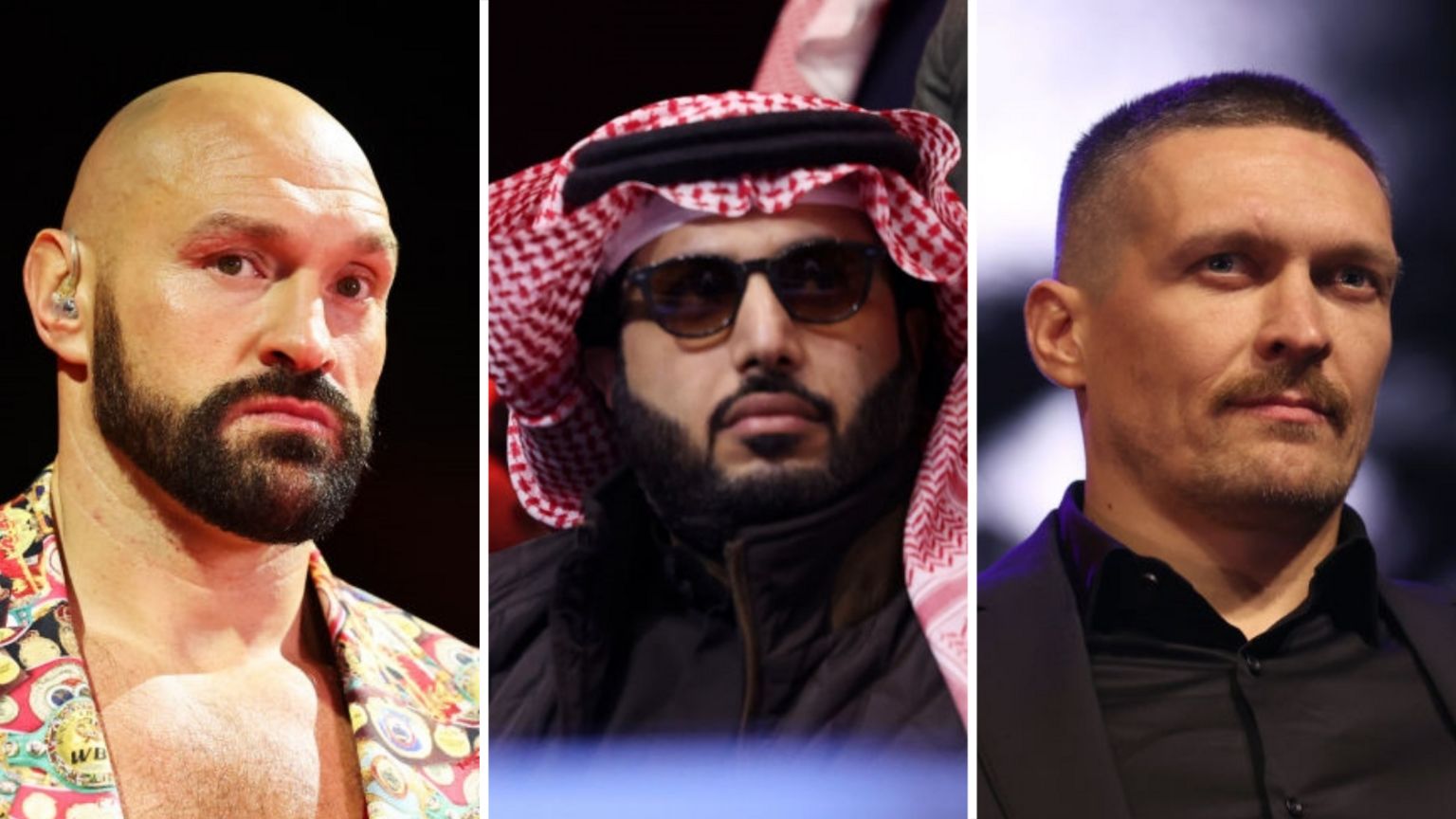 Image source, Getty Images
Image source, Getty Images
Saudi Turki Alalshikh (middle) was influential in getting Tyson Fury (left) and Oleksandr Usyk to agree terms for the undisputed heavyweight title fight
Kal Sajad
BBC Sport in Riyadh, Saudi Arabia
On 30 April 2023, BBC Sport asked: why are boxing’s biggest fights not happening?
Fans were fed up and rival promoters were playing the blame game as egos, finances and broadcaster commitments got in the way.
Twelve months later, the sport is almost unrecognisable – thanks largely to the involvement of energy-rich Saudi Arabia.
On Saturday, Tyson Fury and Oleksandr Usyk contest the undisputed heavyweight world title fight in Riyadh – the latest high-profile fight to be held in the Saudi capital in recent months.
Boxing has been given a facelift but, as with most cosmetic procedures, there are risks attached.
Fighters are earning high pay cheques, yet a just handful of British fans can afford the luxury of travelling to the Middle East.
Promoters are working together but critics point to a “flat” atmosphere in Saudi Arabia.
With ongoing allegations of 'sportswashing' directed at the nation added to the mix, BBC Sport explores the impact of the Saudi boxing takeover and what it means for the fight game closer to home.
Record purses for male boxers
Money was the biggest obstacle when then-world champions Anthony Joshua and Deontay Wilder failed to agree terms in 2018 or when Fury-Usyk negotiations in London stalled last year.
But money has also provided the solution – with Saudi Arabia splashing enough cash to please all parties.
Fury will reportedly earn £78m against Usyk while Joshua is said to have earned a staggering £39m against Francis Ngannou.
It is not just the heavyweights who are benefiting. The postponed undisputed light-heavyweight contest between Artur Beterbiev and Dmitry Bivol - a match-up which excites the sport’s hardened supporters - will be hosted in Saudi Arabia.
Marquee fights are being made with fighters rewarded handsomely, but for all the optimism, female boxing is being neglected by the kingdom.
Women’s rights are an ongoing issue in the country and although Briton Ramla Ali competed in Jeddah in 2022, there does not seem to be an appetite among Saudi bosses to host a female fight.
June’s unprecedented five v five event in Riyadh – featuring rivals-turned-friends Frank Warren and Eddie Hearn pitted against each other – is the latest missed opportunity to offer at least two female fighters the same lucrative pay cheques as their male counterparts.
‘A true boxing fan’ - the influence of Alalshikh
Image source, Getty Images
Image caption,Fury will fight back-to-back bouts in Riyadh while Joshua’s last two fights have also taken place in the city
With a two-hour time difference in the summer, main events in Saudi are televised at a palatable time for UK audiences.
“The beauty is that we no longer have to wait until four or five in the morning to watch a Las Vegas fight,” Warren tells BBC Sport.
Turki Alalshikh, chairman of Saudi Arabia's general entertainment authority, is the man credited for making it happen.
Armed with the riches of his nation, Alalshikh convinced Warren and Hearn to bury the hatchet.
The pair have co-promoted shows in the last six months, having reportedly never even spoken to each other before.
“We’ve all seen, myself particularly, so many opportunities for the undisputed championship fall by the wayside over the years because the money wasn’t there or there were politics involved,” Matchroom's Hearn adds.
But with so much control in the hands of one man, there is still uncertainty over what happens when Alalshikh - who Hearn describes as a “true boxing fan" - is no longer at the helm.
‘Soulless’ atmosphere but should we give it time?
Image source, Getty Images
Image caption,Alalshikh’s influence extends to easing rivalries between broadcasters too - Fury-Usyk will be shown simultaneously on TNT Sport, Dazn and Sky Sports in the UK
Boxing in Saudi Arabia is starkly different to the pageantry of a Las Vegas fight week and lacks the lure of a London stadium showdown.
Joshua’s ‘Day of Reckoning’ and ‘Knockout Chaos’ events did not seem to infiltrate the wider public in Riyadh.
Taxi drivers, shopkeepers and hotel staff were generally unaware of any boxing taking place.
Joshua has not been mobbed by fans at fight-week festivities, which Warren says is a sign of the “respectful” culture and why fighters enjoy competing there.
Musicians Eminem and Kanye West and legendary fighters like Lennox Lewis and Mike Tyson have attended fight weeks to add some stardust.
But those watching on TV often describe the atmosphere as “soulless”. In March, the loudest roar of the night came when football manager Jose Mourinho entered the venue as featherweights Nick Ball and Rey Vargas were contesting their world-title bout.
In previous shows, spectators have even left before the main event.
Boxing lives and dies by its atmosphere and the live event. The gasps of a crowd witnessing a knockout and the emotions at ringside enhance the viewing pleasure.
Warren says there is “still an atmosphere” but acknowledges it was far from “raucous”. He also points to the “ignorance” of those who blame it on a lack of alcohol, which is outlawed in Saudi.
Ziyad ‘Zizo’ Almaayouf, the only Saudi fighter to have featured on a pro event in Riyadh, asks for patience.
“In the Arab world, a Sunday is a work day. So when AJ walked out against [Otto] Wallin at 03:30 local time on a Saturday, most people had work in a few hours,” Zizo says.
“It’s not's the same intensity as the US but that’s because you need to give it time.
“Arab fans in general go crazy about sport. Just look at how they are in football.”
A comparison of Fury and Usyk's boxing styles ahead of their undisputed heavyweight fight.
Riyadh season to arrive in London?
Boxing forms part of Saudi Arabia's 'Vision 2030' strategy, with the kingdom hosting high-profile sporting events to diversify its economy away from relying heavily on oil.
But critics argue it is to deflect attention away from a poor human rights record.
The emphasis on promoting Saudi Arabia’s image is apparent in boxing.
News conferences begin with applause for the Crown Prince, Mohammed bin Salman Al Saud, while promoters and boxers often express gratitude for Alalshikh in interviews.
For all its investment in boxing, however, there is growing discontent from fans who fear they may never see Fury and Joshua compete on British soil again.
That criticism is not lost on the Saudis. Alalshikh will fund an event in Los Angeles in August and a Wembley Stadium event featuring Joshua is in the works for September.
Warren says the Wembley show will be a "cultural event" promoting Saudi’s Riyadh Season.
Time will tell whether Alalshikh will bring big-time boxing to the UK on a consistent basis or if this is merely a bone being thrown in the direction of fans, and whether there might be a new-found interest in women’s boxing.

 5 months ago
48
5 months ago
48




